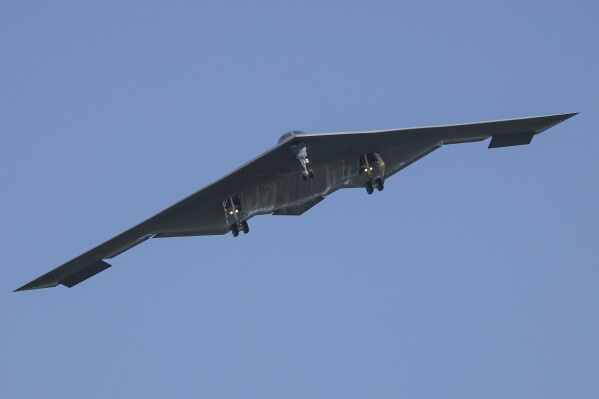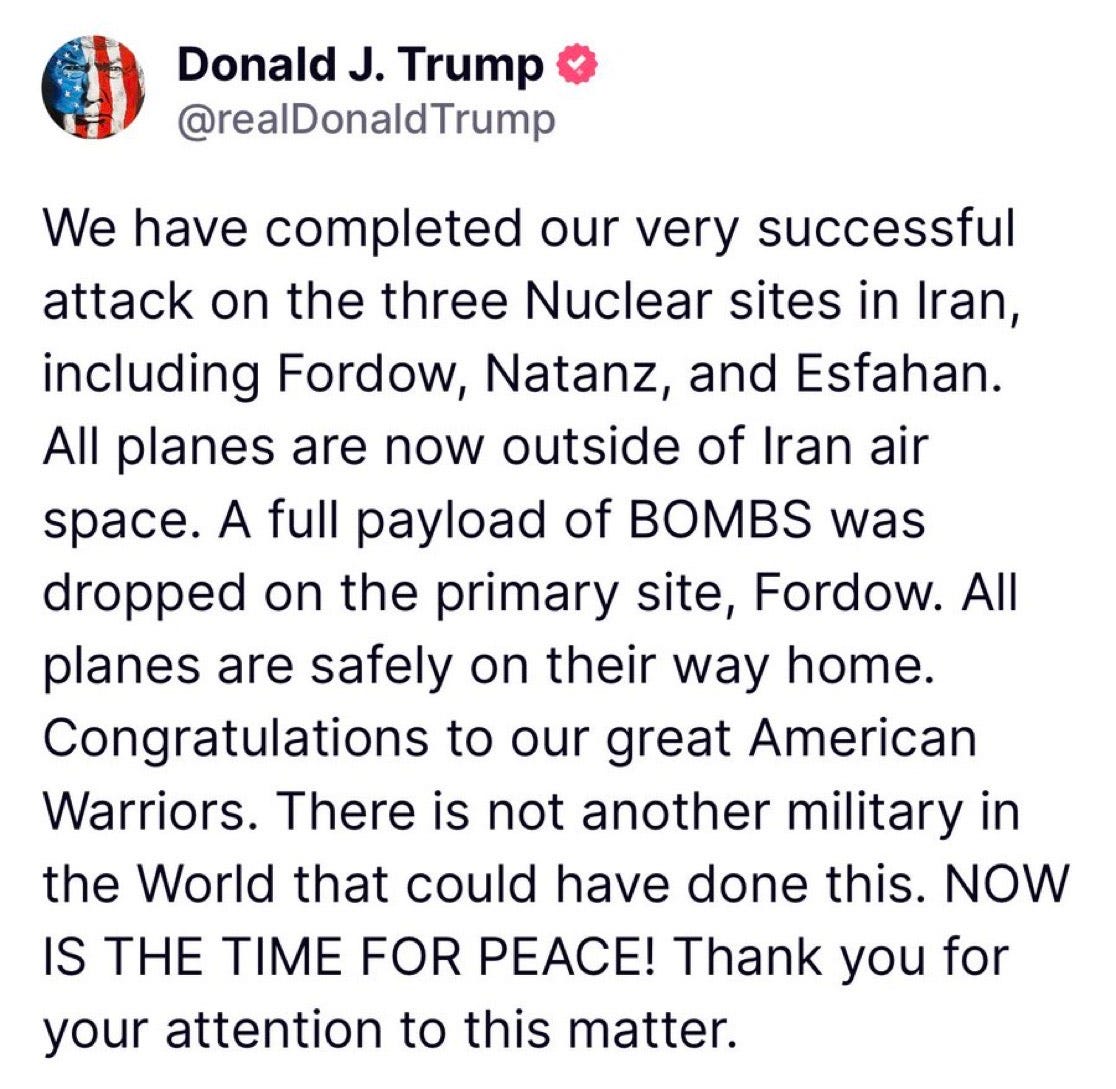Consequences of Trump's Unilateral Attacks on Iran, and Iran's Response
Welcome to Ramin’s Space, the newsletter from science writer and editor Ramin Skibba. You can read more about the newsletter here. If you like it, please consider subscribing and sharing this post.

I remember the run up to the Iraq War. I and millions of others protested the year-long buildup toward that war, which was aimed at regime change and securing oil supplies. The casus belli was based on clearly limited and misleading evidence of weapons of mass destruction, which we should not be surprised were nonexistent. The Bush administration, with support from key Democratic leaders, including Joe Biden and Hillary Clinton, was responsible for the aftermath: the destruction of Iraqi society, a country-wide civil war, the creation of ISIS, and as many as one million civilian deaths and the displacement of many more people.
Almost all conflicts eventually end at the negotiating table. The question is: How much death and destruction will come first?
This weekend the US joined Israel’s war on Iran, something Israeli leaders have been angling for since the 2000s. This time, the run-up toward the US’s bombing took days rather than months. Netanyahu and Trump have called for regime change in Iran. Israel began its attacks earlier this month, days before Trump was set to continue negotiations with Iran on a nuclear agreement, apparently along similar lines as the original one negotiated in 2015 (which Trump scuttled during his first term).
Israel’s waves of attacks have resulted in nearly 1,000 Iranian deaths, while Iran has launched missiles and drones in response that have also caused damage and killed at least 24 Israelis. Israel’s region-wide war has now caused as many as 100,000 deaths and destabilized multiple countries. While Israel’s government, under any leadership, would understandably want to respond in some manner to Hamas’s attacks on October 7, 2023, there is no justification for a genocidal war against Palestinians in Gaza. Then Israel waged war against Lebanon and Syria, while seizing some territory from both, and against Yemen. Now, with US support, it’s attacking Iran.
Then came “Operation Midnight Hammer,” Trump’s attacks on late Saturday night (or midday US time), when the US deployed B-2 bombers to detonate the most destructive non-nuclear weapons ever created, hitting nuclear sites in Natanz, Fordow, and Esfahan. Satellite images revealed the extent of damage caused by these 30,000-pound “bunker-buster” bombs, as you can see in reporting in WIRED and Washington Post. immediately afterward, Trump posted on social media that “NOW IS THE TIME FOR PEACE!,” sounding more than Orwellian, as absurd as the marauding aliens of “Mars Attacks!” Here is Trump’s full post.
The attacks violate international law, though of course the US, like Israel, has mostly enjoyed impunity with regard to that. They also violate US federal law, but only a minority of Congress members has strongly opposed them. As a journalist, I must also acknowledge the role of the media, especially the New York Times, in supporting the Iraq War and these attacks on Iran.
Importantly, the bombings, which are the first direct US attack on Iran within the country’s borders in nearly a half century, violate Iran’s sovereignty. Let me add some historical and geopolitical context to this: After enduring repeated meddling by the British Empire, Iranians suffered the consequences of a CIA-backed coup d’etat in 1953, which included the subsequent US-backed dictatorship under the Shah, when Iran was used as a pawn during the US’s Cold War against the Soviet Union. Iranians of all stripes rose up against the regime, and the Shah’s reign ended with the revolution in 1979, but Islamists eventually took power in the vacuum that followed. Today, like Americans’ views of Trump in the US, a slight majority of Iranians dislike aspects of their government, and the Islamic regime has its own border agents deporting Afghan refugees. But it is nonetheless the legitimate government of Iran at this time. Iran is besieged by numerous US military bases on almost every side, and Iranians have seen the devastation wreaked by the US’s invasion of Iraq on its western border and Afghanistan on its eastern one.
As always, I had hoped for peace. Maybe the Iranian government could have avoided a military response and by doing so, declared that it would agree to a nuclear accord on more favorable terms. But I knew that scenario was unlikely. When has a bombing ever led to diplomacy? It’s not like Japan’s attack on Pearl Harbor in 1941 was a prelude to negotiations with the Roosevelt administration.
Today Iran responded militarily, launching missiles at one of the US’s bases nearby, the Udeid Air Base in Qatar. No casualties were reported. (Note: Qatar is just on the other side of the Persian Gulf, so Udeid, like other US Middle Eastern military bases, is closer to Iran than, say, Cuba is to Florida.) Iran also threatened to close the Strait of Hormuz, but has not done so. Considering what Iran could have done—this constitutes a much smaller response than to Trump’s assassination of General Qasem Soleimani in 2020—under the circumstances, this seems limited.
Unlike in Israel and in the US, voices of restraint, moderation, and diplomacy currently make up the majority of Iran’s leadership. But I fear those people could be sidelined now. US intelligence agencies and International Atomic Energy Agency believe Iran has not had a military nuclear program since 2003, if it ever had one at all. Iran recently enriched uranium to 60%, apparently as a bargaining chip for negotiations, which Netanyahu and Trump have torpedoed. One needs 90% enrichment for it to become weapons-grade, in addition to a nuclear warhead and a delivery system, which most experts believe Iran does not have, although its military does have extensive missile capabilities.
Now we wait to see how the Trump administration responds. I doubt Trump will return to the negotiating table anytime soon, but maybe the international outcry, protests, and shifting public opinion will apply some pressure. Iran’s still smarting from Trump’s and Israel’s attacks, and it probably won’t resume negotiating presently either. As of the afternoon of June 23, Trump says on social media that Israel and Iran have now agreed to a ceasefire, beginning tomorrow, and then “the War will be considered, ENDED!” We shall see.
I hope to soon investigate the impacts of these dubious military and foreign policy decisions on nuclear nonproliferation, as Iran has now been attacked by two nuclear-armed nations. From Iran’s perspective, negotiating with the United States may look like a fool’s errand. Iran has so far received little benefit from participating in the Non-Proliferation Treaty, while nuclear-armed Israel, Pakistan, India, and North Korea are not parties to the treaty and have not been attacked. It’s as if the only reliable deterrence is a nuclear one. Iran probably moved some or all of its enriched uranium out of its known sites before the bombings, and if the government were to shift its view on nukes, it could move toward developing a nuclear weapon, possibly within a decade. Perhaps Turkey or Saudi Arabia or Egypt would attempt to do the same.
The international civil nuclear energy regime also takes a blow from Israel’s and the US’s attacks on Iran. If a fossil fuel-powered country cannot attempt to shift toward nuclear energy without risking attack or controlling how it accumulates nuclear fuel, that’s a serious problem. (I wish Iran invested more in solar power too, but that’s another story.)
I recommend following coverage of this evolving situation on Zeteo news, and I recommend this commentary by Sarah Lazare and Adam Johnson on their newsletter. ‘Die Once, Mourn Once’ is a movingly written essay by Amir Ahmadi Arian in the New York Review of Books, and this New Yorker interview by Isaac Chotiner of nuclear expert James Acton is insightful too.
In other writing…
A Traveler Waits in the Stars for Those Willing to Learn How to Look, by Josh Sokol in the New York Times
Botched By Design, a piece in The Baffler about lethal injection, by Charlotte Rosen
Shadow of a Doubt, an essay about OCD by Andrew Kay in Harper’s magazine
More about me: I’m a science writer, editor, and journalist based in the Bay Area. I was WIRED magazine’s space writer until December 2023, and before that I worked as a freelance writer and an astrophysicist. You can find me at my website, raminskibba.net, and on Bluesky and Twitter. I’m also former president of the San Diego Science Writers Association (SANDSWA) and on the board of the National Association of Science Writers (NASW), though the opinions I express are mine alone. If someone has forwarded this email to you, you’re welcome to subscribe too.



